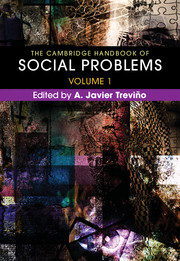Book contents
- The Cambridge Handbook of Social Problems
- The Cambridge Handbook of Social Problems
- Copyright page
- Contents
- About the Contributors
- Introduction
- Part I General Concerns and Orientations in the Study of Social Problems
- Part II Historical and Theoretical Issues in the Study of Social Problems
- Chapter 11 Settlement Sociology
- Chapter 12 Chicago School: City as a Social Laboratory
- Chapter 13 Luhmann's Sociological Systems Theory and the Study of Social Problems
- Chapter 14 The Conflict Approach
- Chapter 15 Radical Interactionism and the Symbolism of Methamphetamine
- Chapter 16 Social Constructionism
- Part III Problems of Discrimination and Inequality
- Part IV Problems of Institutions
- Index
- References
Chapter 13 - Luhmann's Sociological Systems Theory and the Study of Social Problems
from Part II - Historical and Theoretical Issues in the Study of Social Problems
Published online by Cambridge University Press: 16 March 2018
- The Cambridge Handbook of Social Problems
- The Cambridge Handbook of Social Problems
- Copyright page
- Contents
- About the Contributors
- Introduction
- Part I General Concerns and Orientations in the Study of Social Problems
- Part II Historical and Theoretical Issues in the Study of Social Problems
- Chapter 11 Settlement Sociology
- Chapter 12 Chicago School: City as a Social Laboratory
- Chapter 13 Luhmann's Sociological Systems Theory and the Study of Social Problems
- Chapter 14 The Conflict Approach
- Chapter 15 Radical Interactionism and the Symbolism of Methamphetamine
- Chapter 16 Social Constructionism
- Part III Problems of Discrimination and Inequality
- Part IV Problems of Institutions
- Index
- References
Summary
This chapter discusses social problems from the perspective of Niklas Luhmann's sociological systems theory. We argue that his theory provides a rich framework to gain relevant insights for the study of social problems. The key element of systems theory is the concept of functionally differentiated society, that is, a heterarchical arrangement of social systems such as the economy, polity, religion, science. Luhmann's theory connects core ideas from both realist and constructionist epistemologies without ending up in inconsistencies or contradictions. The theory gives justice to realism insofar as it takes the systemic nature of social phenomena seriously and it defies simplistic models of causality, steering, planning, and intervention. Systems theory is constructionist insofar as it takes the multiperspectivity of modern society seriously: many social systems construct their own definitions of social problems including underlying causalities and values. The same social problem appears differently from different systems’ perspectives.
Information
- Type
- Chapter
- Information
- The Cambridge Handbook of Social Problems , pp. 221 - 240Publisher: Cambridge University PressPrint publication year: 2018
References
Accessibility standard: Unknown
Why this information is here
This section outlines the accessibility features of this content - including support for screen readers, full keyboard navigation and high-contrast display options. This may not be relevant for you.Accessibility Information
- 1
- Cited by
